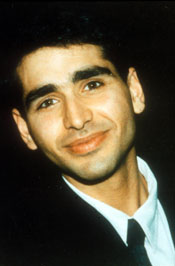The Reza K. Gandjei Program in Medical Ethics
Reza Gandjei was devoted to resolving difficult dilemmas in bioethics. He pursued an interdisciplinary education that allowed him to work on the interface of clinical medicine, ethics, and public policy. His years of study in Great Britain and his Iranian heritage endowed him with a keen international perspective, which was exemplified in his work on the world-wide AIDS epidemic. Reza astutely realized the need to take into account each country's culture, history, and medical resources.
Advances in biomedical research have raised new bioethical issues in a world that is increasingly interdependent. Reza's focus on the international aspects of bioethics and on public policies regarding bioethical issues positioned him to be a leader in addressing these issues. His perspective is essential to assuring that medical advances can be utilized worldwide.
In Reza's memory, the Reza Gandjei Program in Bioethics is being established at the University of California San Francisco (UCSF), where Reza carried out his residency training. Establishing a bioethics program in his name at UCSF will allow the UCSF Program in Medical Ethics to pursue the important issues that Reza would have addressed, and train other scholars to carry on his vision.

| Gandjei Lecturers |
|---|
|
Annually, the Department of Medicine sponsors the Reza Gandjei Memorial Lecture in Medical Ethics by a distinguished visiting professor. These lectures have inspired residents, students, faculty, and staff about the important work to be done in resolving difficult dilemmas in clinical medicine, ethics, and public policy. 1999 — Ezekiel Emmanuel, MD |
His story:
Reza K. Gandjei was a remarkable student and physician with a special interest in problems of medical ethics. A native of Iran, he had his secondary schooling in England and graduated magna cum laude from the University of California, Berkeley, where he developed a student-run seminar course on bioethical issues in health and medicine.
He entered Harvard Medical School in 1987, and assumed leadership roles in projects ranging from the provision of weekly health education classes to Boston high school students to the organization of the first Soviet/American medical student exchange program with the Second Pirogov Medical College of Moscow.
As a third-year medical student, he was selected for both the Marshall and Rhodes Scholarships. As a Rhodes Scholar, he received an M.A. (with First Honors) in Philosophy, Politics, and Economics from Oxford University in 1992, and was elected Secretary of his Rhodes class. Immediately thereafter, Reza moved to Cambridge University, obtaining a second Master's degree in Ethics.
In subsequent years, still as a medical student, he worked as Special Assistant to U.S. Surgeon-General Antonia Novello and as a Research Assistant with the World Health Organization in Brazzaville in the area of AIDS research and education.
The noted philosopher and Secretary of the Rhodes Trust, Sir Anthony Kenny, wrote of Reza: "Were he to continue as a philosopher, he would become a very distinguished member of the profession, but I am sure that he will make a greater contribution to society by resuming his medical career." Reza resumed his training in medicine with a goal of furthering our understanding of complex ethical issues in the contexts of clinical practice and education.
After graduating from Harvard Medical School, Dr. Gandjei began his residency training in Internal Medicine at the University of California, San Francisco, in July, 1994. His death was a great loss for his family, friends, colleagues, the community, and the medical profession.